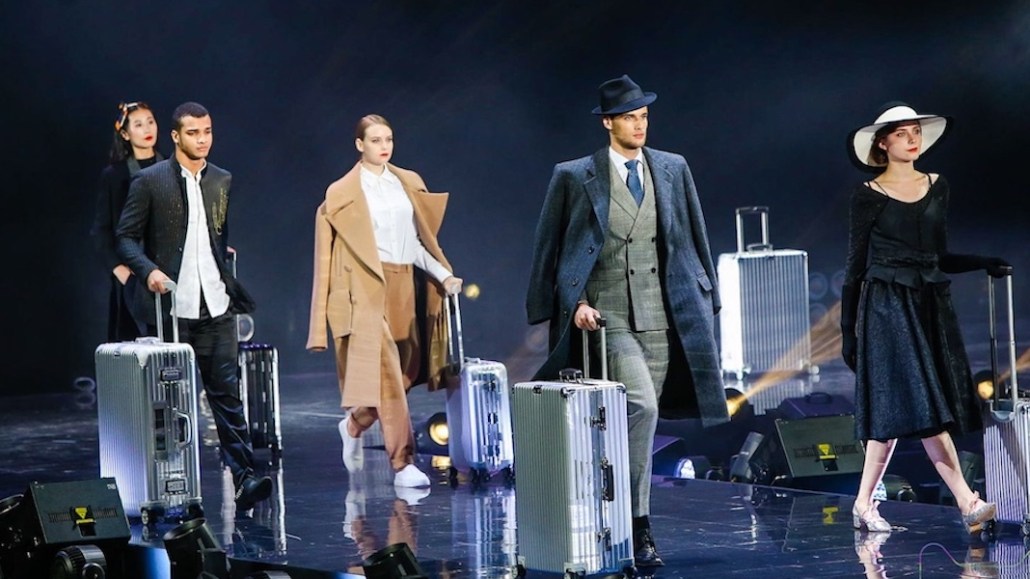Save 50% on a 3-month Digiday+ membership. Ends Dec 5.

Singles’ Day, the massive, promotion-driven shopping event in China that drives the biggest one-day online sales in the world, is not the natural setting for high-end luxury brands — so e-commerce marketplace Alibaba made a place for them.
During the shopping holiday, which takes place annually on November 11 and last year drove $18 billion worth of retail sales for participating sellers, a pop-up luxury hub, “Double 11 Musée,” will appear online and in the Tmall app for high-end brands. The hub can only be accessed through the existing Luxury Pavilion, a special site within the Tmall marketplace exclusive to invite-only luxury brands and shoppers.
Sebastien Badault, the managing director of Alibaba France said Alibaba’s appeal to luxury brands on Singles’ Day is an emphasis on customer engagement. For luxury brands, the company has worked to reposition the event away from promotions, turning the focus instead to opportunities around limited-edition collections and products sold exclusively to Tmall’s high-spending clientele.
“This year, brands are using the Double 11 Musée in the Tmall Luxury Pavilion to offer exclusive experiences, products and brand storytelling to more deeply engage China’s luxury consumers,” Bedault added.
For the first year for the Musée hub, participating brands include Burberry (which announced Thursday that China is the brand’s fastest-growing region), Guerlain, La Perla, La Mer, Rimowa and Tag Heuer. Singles’ Day strategies vary: La Perla is selling limited-edition pajamas embroidered with 18-karat gold; Burberry is selling a version of its trench coat in its recognizable check pattern; La Mer is selling its face cream in an exclusive mother-of-pearl casing; luxury luggage brand Rimowa collaborated with Chinese artist Yue Minjun to sell a set of hand-painted suitcases. Guerlain took its Singles’ Day play offline by sending sales reps to China to offer two-hour appointments for Tmall’s luxury shoppers to make a personalized perfume. The whole ordeal cost “hundreds of thousands in RMB” for Guerlain to pull off, according to a source close to the company.
 The Double 11 Musée hub in the Tmall app
The Double 11 Musée hub in the Tmall app
By taking advantage of Singles’ Day’s massive traffic, luxury brands are getting in front of an important emerging customer base in China. As the luxury market stalls in Europe and America, the Asia-Pacific region, and particularly China, is the only one showing significant growth. Companies like Kering and LVMH, which are seeing sales climb in every market, are seeing double-digit growth in the region (42 and 29 percent, respectively), while brands hit harder by changing customer behavior like Michael Kors and Ralph Lauren are relying the region to lift overall sales.
But since the Chinese luxury customer’s purchases used to largely take place abroad, the complex market can be difficult for high-end brands to conquer solo. Not to mention, China’s online shoppers primarily shop on Alibaba or competitor JD.com, and through social platforms like WeChat and Weibo. Individual e-commerce sites get far less traffic in comparison.
Ad position: web_incontent_pos1
So, Alibaba has emerged as a strategic partner.
“The way that brands have been engaging with the Chinese consumer in the luxury space is changing, and with this market, you have to throw a lot of things you’re used to doing out the window,” said Badault. “The ones that do best are the ones willing to reinvent the most and willing to take some chances, as well. The Chinese customer is also so advanced digitally, whatever these brands can learn from China, they can apply to the U.S. and the rest of the world.”
Alibaba’s willingness to work closely with luxury brands to help them design their site pages, parse customer data and participate in promotional events like Singles’ Day is in sharp contrast to Amazon’s approach. Amazon doesn’t offer a high-touch customer service or experience for luxury brands, and it uses events like Prime Day and Cyber Monday to promote its own private-label brands, rather than outside participating sellers. Alibaba is a third-party marketplace, not a wholesale retailer, a positioning that assuages the fears brands on Amazon have about the company mining customer data to get ahead in the private-label category.
“A lot of brands feel frustrated about the current state of affairs with Amazon,” said Cooper Smith, the head of Amazon research at L2. “It feels like a threat at every turn.”
Alibaba, on the other hand, is promoting participating luxury brands to the right customers on Singles’ Day, even if they’re not selling a special item. Brands in the Luxury Museé hub won’t see the “buy” button on their page if they choose not to include it; instead, shoppers will be shown a “follow page” incentive to subscribe to branded content.
Ad position: web_incontent_pos2
As luxury brands open more stores and e-commerce operations in China, it’s in Alibaba’s best interest to play nice. JD.com is gunning to recruit the same brands to its platform, with concierge delivery service for luxury shoppers and a partnership with global marketplace Farfetch already nailed down. Brands like Louis Vuitton and Gucci have decided to chart the territory on their own, opening direct-to-consumer sites.
“A brand-owned site gives these luxury labels control over positioning, description, pricing and listings,” said Rob Nowell, marketing manager at the global analytics firm Brandview. “Brands that have such a strong brand image and want to maintain that are wary of selling on platforms where there’s a lack of control. Alibaba wants to prove it’s not one of those platforms.”
More in Marketing

Ulta, Best Buy and Adidas dominate AI holiday shopping mentions
The brands that are seeing the biggest boost from this shift in consumer behavior are some of the biggest retailers.

U.K. retailer Boots leads brand efforts to invest in ad creative’s data layer
For media dollars to make an impact, brands need ad creative that actually hits. More CMOs are investing in pre- and post-flight measurement.
Ad position: web_bfu




